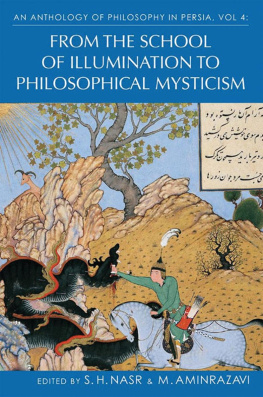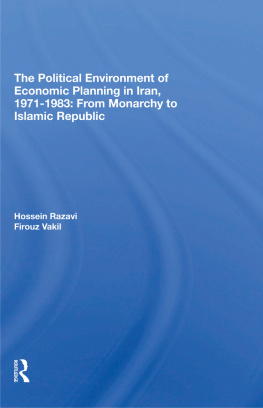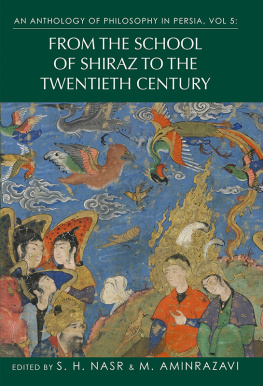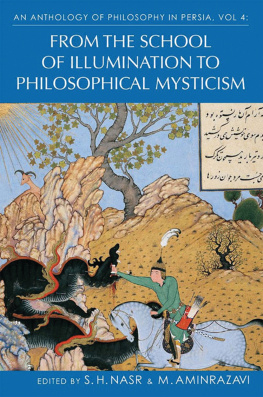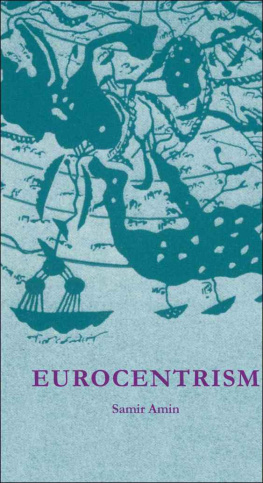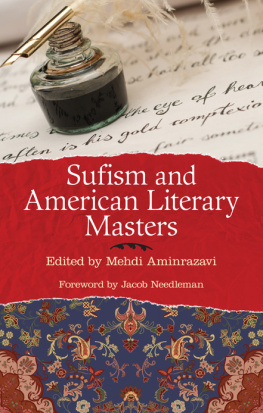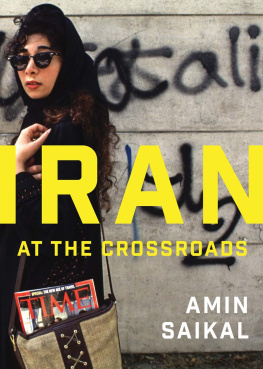THE ISLAMIC INTELLECTUAL TRADITION IN PERSIA
THE ISLAMIC INTELLECTUAL TRADITION IN PERSIA
Seyyed Hossein Nasr
EDITED BY
MEHDI AMIN RAZAVI
First published in 1996
by Curzon Press
Published 2013 by Routledge
2 Park Square, Milton Park, Abingdon, Oxon OX14 4RN
711 Third Avenue, New York, NY, 10017, USA
Routledge is an imprint of the Taylor & Francis Group, an informa business
1996 Mehdi Amin Razavi
Typeset in Times by Excel Books, New Delhi
All rights reserved. No part of this book may be reprinted or reproduced or utilised in any form or by any electronic, mechanical, or other means, now known or hereafter invented, including photocopying and recording, or in any information storage or retrieval system, without permission in writing from the publishers.
British Library Cataloguing in Publication Data
A catalogue record for this book is available from the British Library
Library of Congress in Publication Data
A catalog record for this book has been requested
ISBN 13: 978-0-700-70314-2 (hbk)
Contents
.
.
.
.
.
.
.
.
.
.
.
.
.
.
.
.
.
.
.
.
.
.
Acknowledgements
I would first and foremost like to express my gratitude to Seyyed Hossein Nasr for his generous cooperation and invaluable advice regarding many aspects of this work. The present collection of essays could not have been completed without his assistance. I also wish to thank the author for granting me the permission to use the articles included.
I would also like to thank Marylynn Aminrazavi for her numerous editorial suggestions and also her comments on my translations of several articles of this volume. I would especially like to thank Harriet L. Brennan for taking a personal interest in the project and her administrative help and suggestions as well as Cindy A. Toomey.
Finally, I wish to thank various publishers for their permission to use articles and chapters that had previously appeared in their publications. A number of the works cited in this volume have had later editions with some revisions in them. I have not listed such works in the text but their latest editions are as follows:
1. Three Muslim Sages, Lahore: Suhail Academy, 1988.
2. History of Islamic Philosophy, Trans. Liadain Sherrard, London: Routledge and Kegan and Paul, 1993.
3. Ideals and Realities of Islam, San Fransisco, Harper Collins Publishers, 1994
4. Science and Civilization in Islam, New York: Barnes and Noble, 1992
5. Sohrawardi. Oeuvres Philosophique et Mystiques, Vol. III, Tehran: The Institute for Cultural Studies, 1993.
6. An Annotated Bibliography of Islamic Sciences. With W. Chittick Vol.III, Tehran:, The Institute for Cultural Studies, 1991.
7. Islam and the Plight of Modern Man, Lahore: Suhail Academy, 1988.
8. Islamic Life and Thought, Lahore: Albany (N.Y.), State University of New York Press 1981.
For more information concerning the latest edition of Seyyed Hossein Nasrs publications see: The Complete Bibliography of the Works of Seyyed Hossein Nasr: From 1958 Through April 1993. (ed.) M. Aminrazavi and Z. Moris, Kuala Lumpur: Islamic Academy of Science of Malaysia, 1994.
The essays collected in this volume were written over many years by Seyyed Hossein Nasr on the Islamic intellectual tradition in Persia. These writings, which were scattered among numerous journals and collections, have been brought together into a single volume, thereby making it more accessible for the general reader. The essays gathered here provide us with a major study of philosophical activities in Persia since their inception. Moreover, they bear witness to a life devoted to scholarship and are essential for a better understanding of the general intellectual history of Islam and the contributions of Persian philosophers.
Over a lifetime of scholarship, Seyyed Hossein Nasr has dealt with almost every facet of the spiritual and intellectual tradition in Persia and its contributions to the Islamic world. Having demonstrated the remarkable consistency and persistence of philosophical themes in Persia, Nasr presents a world view whose pivotal point has been the quest for the Eternal.
Nasrs attempt to discern the contributions of Persian philosophers has taken him on a journey from Iran to the West and back. Having carried out his early education in a traditional setting, Nasr came to the West where he pursued his studies first in physics and geology and later in both the history of science and philosophy.1 Following the completion of his graduate work at the Massachusetts Institute of Technology and Harvard, his quest for the sophia perennis led him back to Iran where he began to study philosophy and ikmah (theosophy) with some of the traditional masters while he taught at Tehran University. Among his teachers were Allmah Muammad Kzim Ar, Allmah Sayyid Abul-asan Qazwn, and Allmah Sayyid Muammad usayn abab, with whom he studied for over twenty years. Nasrs association with these and a number of other traditional philosophers left an indelible mark upon his philosophical orientation. His earlier familiarity with the works of such traditionalist metaphysicians in the West as R. Gunon, F. Schuon, and A. Coomaraswamy had uniquely qualified him to carry out comparative work in metaphysics.
Upon his return to Iran in 1958, Nasr found himself in an intellectual milieu which ranged from certain jurists who identified philosophy as kfr (heretical) to modernists who regarded the force of traditional philosophy as dwindling and advocated Western philosophy, in particular the ideas of Marx, Sartre and Heidegger. Nasr provided a response to such challenges, not by engaging in a direct dialogue with the propagators of Western philosophy, but by showing the richness of the tradition in Islamic philosophy and reformulating traditional philosophical doctrines in a language modern man could understand. For Nasr, no philosophy which ignores both revelation and intellectual intuition and thus divorces itself from the twin sources of transcendent knowledge can hope to be anything but a disrupting and dissolving influence in Islamic society.2
Nasr views philosophy not as a mere rational activity but as a quest for the Eternal, resulting from a longing within every man to find his original abode. Philosophizing for Nasr, therefore, is the process of reminding ourselves of the forgotten truth and the task of philosophy is to bring about recollection and to reacquaint ourselves with our true related to selves. Having defined philosophy as a sacred activity related to, the philosophia perennis Nasr tells us that its aim is unveiling the truth, which for him is God. Philosophy therefore, becomes a quest for Divine Wisdom or what Nasr calls theosophia, 3 the rightful activity of the intellect and not the merely rational activity of a discursive nature.
Since Nasr sees philosophy as a means by which one can remember God, he sets out to do a type of philosophizing which, properly speaking, can be called philosophical anthropology. A philosophical study, Nasr argues, should not only be limited to its discursive aspects but should include the study of the manifestations of the sacred. Human existence, therefore, is fundamentally a spiritual journey and one must engage in a spiritual hermeneutic (




